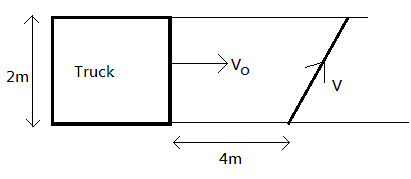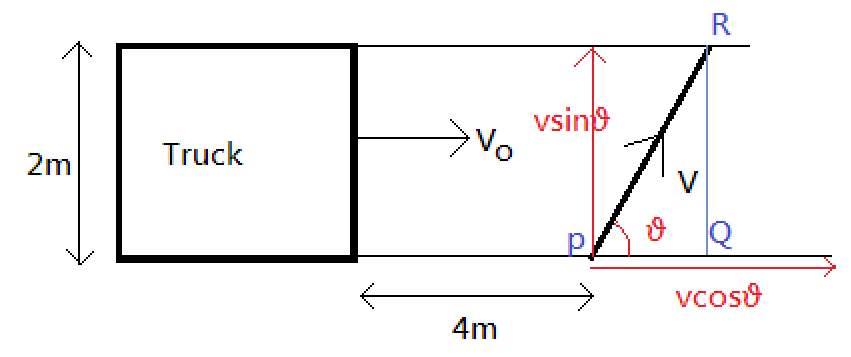Question
Question: A \(2m\) wide truck is moving with a uniform speed \({v_0} = 8m{s^{ - 1}}\) along a straight horizon...
A 2m wide truck is moving with a uniform speed v0=8ms−1 along a straight horizontal road. A pedestrian starts to cross over the road with a uniform speed v when the truck is 4m away from him. The minimum value of v so that he can cross the road safely is

A. 2.62ms−1
B. 4.6ms−1
C. 3.57ms−1
D. 1.414ms−1
Solution
Split the velocity of the pedestrian in horizontal and vertical components. The distance to be travelled by the pedestrian is 2m . The truck is moving horizontally, so for the pedestrian to safely cross the road; the horizontal distance by the pedestrian (x)m must at least equal to the distance travelled by the truck (x+4)m .
Complete step by step answer:
Please note that the pedestrian will take the same time to travel in the vertical direction as much time taken to travel in a horizontal direction. But in the meantime the truck will also move some distance. We know for sure that the pedestrian has to travel a vertical distance of 2m .
Consider that the pedestrian travels at an angle θ with the horizontal as shown below:
And let's split the velocity of the pedestrian.

Note that the distance PQ=2cotθ
For vertical direction.
Velocity of the pedestrian =vsinθ and the distance to be travelled =2m
So, the time taken will be:
tp=vsinθ2
Where tp is the time taken by pedestrians.
At the same time the truck will move some horizontal distance. The truck will move a total distance of 4m+PQ=4+2cotθ
The minimum time taken by pedestrians to cross vertical distance will be the same as the time taken by the truck to cover 4+2cotθ distance.
⇒tp=vsinθ2=84+2cotθ
Solving this equation, we will get the minimum velocity for the pedestrian to cross safely.
v=(2sinθ+cosθ)8 --equation 1
By properties of differentiation, the minimum velocity is obtained when
dθdv=0
⇒dθdv=(2sinθ+cosθ)−8×(2cosθ−sinθ)=0
⇒(2cosθ−sinθ)=0
sinθ=52;cosθ=51
Substituting these values in equation 1 , we get
v=2×52+518
v=58
v=3.57ms−1
So, the correct answer is “Option C”.
Note:
In such types of questions, remember that the vertical distance is fixed. So, time can be calculated. Now the truck too takes the same time to reach the pedestrian.
Also remember that this is the minimum speed.
The mean time the truck will also move some distance.
